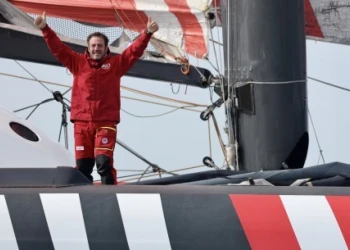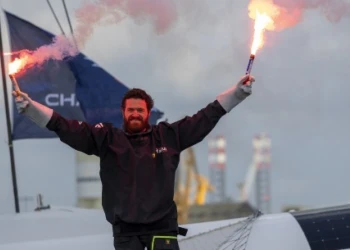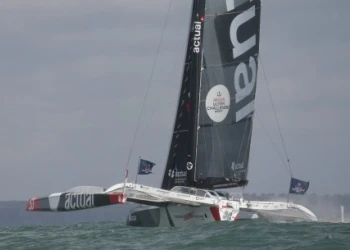
Ultim Challenge, Le Cléac'h crosses Cape Horn
Ultim Challenge, Le Cléac'h crosses Cape Horn
Second placed Armel Le Cléac'h crossed Cape Horn in very manageable conditions this Sunday morning at 05:01:50hrs UTC. In fifth Éric Péron was about to enter the Pacific this morning. Third placed Thomas Coville had a big scare on Friday, as he recalls.
Armel Le Cléac'h rounded Cape Horn this Sunday morning in modest conditions during the South American night. He passed about fifteen miles off the legendary rocky islet. It's his fourth passage of the Horn the skipper of the Maxi Banque Populaire having passed close up, and by day, during his first Vendée Globe in 2008-2009 aboard BritAir.
Le Cléac'h was upwind in around fifteen knots of northerly wind. But he may not be quite done with Southern Ocean conditions. Two options are open to him for his ascent of the South Atlantic. He can go as close as possible to the coast and sail downwind in a 45 knot southwesterly wind, or push towards the east to sail upwind in 15kts of wind but bordering the ice zone. A member of the race management team, Fred le Peutrec, flew over the area again yesterday to check the movements of the ice which had been spotted north of the ZEA, and everything seems clear.
Éric Péron was 160 miles from Tasmania's South-East Cape at 0630hrs UTC, ready to pass into the Pacific. Some 1,200 miles ahead of him, to the east, Anthony Marchand left Dunedin, all repairs carried out, this morning at 0512hrs after a little more than 28 hours of technical stopover. He sets off again downwind in a medium breeze. The skipper of Actual Ultim 3 should take advantage of a small low pressure system which is just behind him. Paul Meilhat, Sam Davies and Damien Seguin and the Biotherm crew which 'Antho' sailed The Ocean Race with all sent messages of support yesterday.
The leader off Rio
The race leader Charles Caudrelier is tacking upwind as close as possible to the Brazilian coast. Beating into 16 knots of north wind he is going more than 20 knots, constantly seeking the right compromise between maximising VMC northwards but not burning himself out with too many manoeuvres. The skipper of Edmond de Rothschild is some 360 miles from Rio de Janeiro where the carnival has been in full swing.
Thomas Coville should cross Cape Horn this evening chased by a huge depression with a slightly less nasty one ahead of him. Increasingly he feels like he is walking a tightrope, as he explains. "We're in between these systems and we're trying to make our way, it is not easy, forecasts are never exactly matching up to reality."
Yesterday he recalled two small accidents, falls on board which he says are really the first of his career. One of them badly bruised his shoulder, as he reports:
"Something happened to me which I have always worried about, but which didn't turn out to be very serious. I came close to injuring myself, an accident. The boat went into a surf with the very powerful swell coming from behind, it stalled into a wave. I was at the nav table, which swivelled with the inertia and I went straight on. I couldn't grab hold of anything. It's a mistake for a sailor to fall. I fell 2.5m to crash into the glass roof. I tried to protect myself but my right shoulder hit. It was extremely violent, I had a lot of pain. I don't think I lost consciousness, but within a few tenths of a second you get scared."
"And then you worry about what if this incident might have left me disabled in one arm. What would happen, then, just because you did not have or know how to have the best position at the right time, for the movement of the boat, which you must be attentive to all the time? Everything is fine. I had incredible medical assistance. Laure and Marine were there, they reassured me and instructed me and, in 24 hours, things are OK."
"But you are left with this feeling of being always on a high wire which makes us understand how close things come. Like in the Indian when I went out on the float to manually hook my foil to be able to use it and out there on the float, there is the dark sea which appears like an abyss. These moments remind us that this competition is a challenge and that we must never cross this line. I have often been asked if I get scared. Yesterday (Friday), yes, I was afraid of no longer being able to do a maneuver, to roll the gennaker. Things could change so quickly and, suddenly, become critical or dangerous. We know that. It's like damage, you can touch it and it can happen from one moment to the next. We live with it, but when it gets closer or when you see it happening, the awareness of it becomes very strong."




